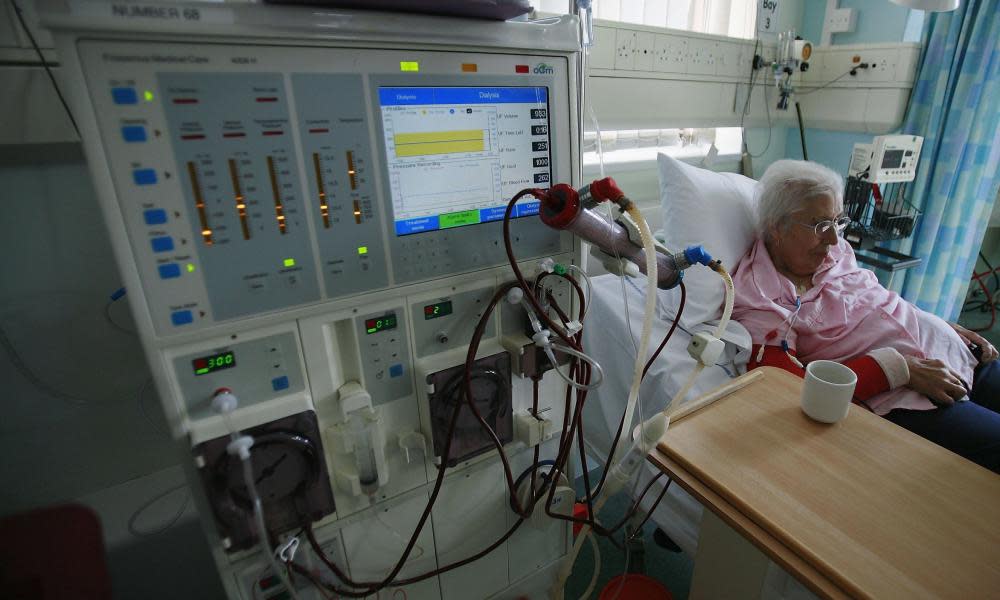Kidney disease drug recommended by Nice 'may do more harm than good'

The UK’s drug guidelines body is recommending a type of medication to treat chronic kidney disease despite no firm evidence that it benefits patients – and some signs that the drugs may do more harm than good, experts have warned.
Phosphate binders are commonly prescribed to lower blood phosphate levels in patients with advanced kidney disease, including those on dialysis. High phosphate has been linked to worse patient outcomes, including bone and muscle problems, a build-up of calcium in the blood vessels causing them to stiffen, and an increased death rate.
Experts say current recommendations by the National Institute for Health and Care Excellence (Nice), which advocate the use of phosphate binders, are based on little evidence that they benefit patients.
“No one has ever shown that reducing [phosphate levels], in a trial, actually improves the wellbeing of the patients,” said Prof Phil Kalra, the national specialty lead for renal disorders at the National Institute for Health Research, pointing out that high phosphate levels might simply be a marker of other problems.
Moreover, there are concerns that calcium-based phosphate binders – which are the cheapest option and are recommended by Nice as the “first line” drugs – could do more harm than good. Research suggests that they could worsen the build-up of calcium in blood vessels, linked to increased risk of cardiovascular disease.
According to NHS data seen by the Guardian, and backed up by figures available online, more than 167,000 prescription items for phosphate binders were dispensed in community in England in 2016 alone, amounting to a total cost of £9,442,845.86. Almost 70,000 of these were calcium-based.
“There are many of us who believe that there should be a trial to actually see if lowering phosphate per se, by whatever means, benefits the patient,” said Kalra, adding that studies should also consider the different types of drug. “There is a risk here [that] by thinking we still need to treat phosphate, and by following the Nice guidance, we may be doing more harm to some patients than if we left them alone,” he said, although Kalra stressed that patients currently taking such drugs should not stop their medication.
Newly updated guidelines from the global non-profit kidney foundation Kidney Disease – Improving Global Outcomes (Kdigo) reflect the lack of evidence, acknowledging there have not been enough trials on phosphate binders to make firm recommendations for their use. Instead, the team merely “suggest” that elevated phosphate levels be lowered, whether by diet or drugs, and similarly urge that the use of calcium-based phosphate binders be restricted.
David Wheeler, professor of kidney medicine at University College London and co-chair of Kdigo, said he did not think Nice’s recommendation of calcium-based phosphate binders as the first-line drug was based on evidence.
“My own view is that if non-calcium based binders were as cheap as calcium based binders, we would only be using non-calcium based binders,” he said.
But, Wheeler added, while non-calcium based phosphate binders are less likely to cause problems of calcium build-up in blood vessels, even for these drugs there is a dearth of evidence that they improve patient outcomes, and that clinical trials comparing the different types of drug with each other, and with a placebo, were crucial.
“I think there is an urgent need to address these questions,” he said, adding that trials to tackle the issues had suffered from a lack of funding.
Dr Richard Haynes, a consultant at Stoke Mandeville Renal Unit, agreed. “The short answer is no, we don’t have a robust evidence base at all to support what we are doing in terms of what the guidelines currently say,” he said. “The worst case scenario is that we are trying to intervene on something which is not important and by doing so we are causing harm,” he added. “There is no evidence to say that is definitely what is happening at the moment, but it does make me cautious.”
Dr Sankar Navaneethan, a co-author of a 2011 Cochrane review into phosphate binders, said that at least on the surface, the use of such drugs made sense: “The main biochemical marker that has been consistently associated with cardiovascular disease and mortality is serum phosphorus.”. However, he agreed that clinical trials were needed to explore whether the drugs do indeed benefit patients, but added that such trials might be hindered by ethical concerns – particularly for patients on dialysis.
Commenting on the current guidelines, a Nice spokesperson said: “In light of the available evidence the independent guideline committee on chronic kidney disease felt that, on balance, a recommendation for phosphate binders was more likely to have a beneficial effect than not.”
But, they added, Nice is currently in the process of reviewing the latest evidence for people with late stage chronic kidney disease, including those on dialysis, to explore whether phosphate binders are effective.

 Yahoo News
Yahoo News 
